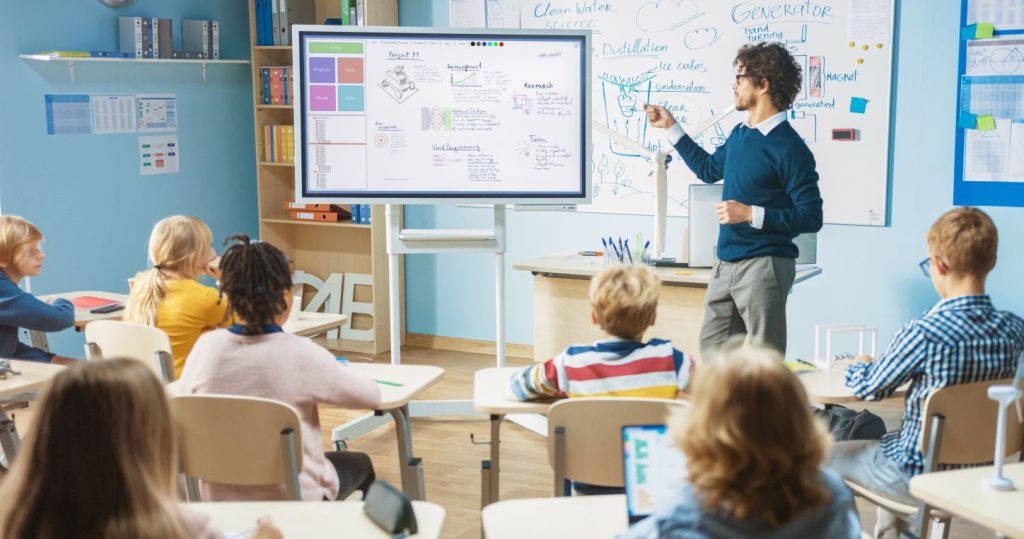The Future of Work and Educational Trends: What’s Changing?
The landscape of work and education is undergoing profound transformations, driven by technological advancements, changing economic conditions, and evolving societal needs. This essay explores the dynamic shifts in the world of employment and the corresponding trends in education, shedding light on the key changes that are reshaping the future of both work and learning.

1. Automation and AI Integration:
The integration of automation and artificial intelligence (AI) is rapidly altering job requirements. Routine tasks are becoming automated, leading to a demand for skills in managing and programming these technologies. Workers need to adapt by developing critical thinking, problem-solving, and creativity.
2. Remote Work and Flexible Arrangements:
The COVID-19 pandemic accelerated the adoption of remote work. Hybrid work models and flexible arrangements are becoming more prevalent, necessitating digital skills and the ability to collaborate effectively across virtual environments.
3. Gig Economy and Freelancing:
The gig economy and freelance work are gaining momentum. Individuals are diversifying their income streams through various platforms. Education must emphasize entrepreneurship, self-management, and financial literacy to prepare learners for this evolving landscape.
4. Lifelong Learning and Upskilling:
The rapid pace of technological change requires continuous upskilling and reskilling. Lifelong learning is no longer a choice but a necessity. Educational institutions are shifting towards offering short courses, micro-credentials, and flexible learning options to accommodate learners’ evolving needs.
5. Emphasis on Soft Skills:
Automation may handle technical tasks, but soft skills remain crucial. Communication, emotional intelligence, adaptability, and teamwork are becoming more valuable as human interaction and problem-solving gain prominence.
6. Personalized and Adaptive Learning:
Technology enables personalized and adaptive learning experiences. AI-driven platforms tailor educational content to individual needs, enhancing engagement and effectiveness. Learners can progress at their own pace and explore topics aligned with their interests.
7. Sustainability and Ethical Considerations:
As societal consciousness grows, businesses prioritize sustainability and ethics. Professionals need a solid understanding of environmental and social issues, prompting educational institutions to incorporate these topics into their curricula.
8. Cross-Disciplinary Collaboration:
The complexity of modern challenges requires interdisciplinary collaboration. The future workforce must bridge gaps between various fields, requiring education to emphasize cross-disciplinary thinking and problem-solving.
The evolving landscape of work and education is being shaped by technological advancements, changing work models, and a shifting skillset. Workers must adapt to the demands of automation, remote work, and the gig economy, while education is moving towards lifelong learning, soft skill development, personalized learning, and sustainability. By staying attuned to these changes, individuals can better navigate the transforming world of work and equip themselves for success in the future.

Unveiling the Changing Landscape of Work and Educational Dynamics: What Lies Ahead?
Introduction: In an era of rapid technological innovation and shifting societal paradigms, the traditional concepts of work and education are undergoing remarkable transformations. This essay delves into the intricate web of changes sweeping across the realms of employment and learning, illuminating the forces and trends reshaping the future of both work and education.
1. Technological Disruption:
Emerging technologies such as artificial intelligence, automation, and robotics are disrupting job markets. Routine tasks are becoming automated, demanding a workforce proficient in leveraging these technologies and possessing high-level cognitive skills.
2. The Rise of Remote Work:
The COVID-19 pandemic has catalyzed the shift towards remote work and flexible arrangements. Virtual collaboration, digital communication, and time management skills have surged in importance as traditional office spaces evolve.
3. Gig Economy and Entrepreneurship:
The gig economy is altering the nature of work, with freelancing and project-based engagements becoming commonplace. As individuals diversify their income streams, entrepreneurial skills, financial literacy, and adaptability are essential for success.
4. Lifelong Learning Imperative:
Continuous upskilling and reskilling have become essential due to the rapid pace of technological evolution. Lifelong learning is a cornerstone of career progression, with educational institutions adapting by offering micro-credentials and short courses.
5. Soft Skills as Anchors:
While automation handles technical tasks, soft skills are invaluable. Empathy, communication, critical thinking, and collaboration skills are indispensable in navigating complex human interactions and solving intricate challenges.
6. Personalized Learning Experiences:
Technology is reshaping learning paradigms, enabling personalized and adaptive educational experiences. Artificial intelligence tailors content to individual needs, enabling learners to explore topics aligned with their interests and learning styles.
7. Ethics and Sustainability Integration:
As ethical concerns and sustainability gain prominence, professionals need a comprehensive understanding of these issues. Educational curricula are adapting to include topics related to environmental consciousness and social responsibility.
8. Transdisciplinary Collaboration:
Modern challenges transcend traditional disciplinary boundaries. The future workforce needs to collaborate across disciplines to tackle multifaceted problems, necessitating an educational emphasis on interdisciplinary thinking.
The nexus of work and education is undergoing a transformative shift, driven by technology, changing work dynamics, and evolving societal priorities. To thrive in this changing landscape, individuals must adapt to automation, embrace remote work opportunities, cultivate soft skills, commit to lifelong learning, and adopt a holistic approach to challenges. By aligning themselves with these transformative trends, individuals can seize the opportunities of the future and carve a path to success in an ever-evolving world.

Navigating the Shifting Tides of Work and Learning: Embracing Change and Seizing Opportunities
The confluence of technological advancements, economic shifts, and evolving societal values is fundamentally transforming the landscape of work and education. This essay further explores the intricate facets of these transformations and delves into the strategies and mindsets required to navigate the changing tides of work and education, while embracing the opportunities they present.
1. The Digital Revolution:
The digital revolution is reshaping industries across the board. Automation, machine learning, and artificial intelligence are rendering traditional job roles obsolete while creating new avenues of innovation. As roles evolve, workers need to adapt by acquiring technical skills and the ability to work alongside intelligent machines.
2. Redefining Workspaces:
The concept of the traditional workplace is undergoing a seismic shift. Remote work and flexible arrangements are blurring geographical boundaries, allowing individuals to collaborate across borders. This calls for effective communication, virtual collaboration, and time management skills.
3. The Empowerment of the Gig Economy:
The gig economy, characterized by short-term contracts and freelance work, offers individuals flexibility and autonomy. Embracing this trend requires cultivating an entrepreneurial mindset, managing one’s own business, and building a personal brand to stand out in a competitive market.
4. The Lifelong Learning Mandate:
As the pace of technological advancement accelerates, the concept of “learn once, work for life” is becoming obsolete. The workforce must continually upskill and reskill to remain relevant. Educational institutions and professionals alike must embrace the concept of lifelong learning to ensure continued growth and employability.
5. Soft Skills: The Human Edge:
While technology augments tasks, human skills remain indispensable. Critical thinking, emotional intelligence, adaptability, and effective communication are critical assets in a world characterized by complex problem-solving and dynamic interpersonal interactions.
6. The Dawn of Personalized Learning:
Advances in technology enable education to become increasingly personalized. Adaptive learning platforms tailor content to individual learning styles, pacing, and preferences. This empowers learners to take charge of their education, fostering a deeper engagement and understanding.
7. Ethical Considerations and Sustainability:
As the world grapples with ethical dilemmas and environmental challenges, professionals must be equipped to address these issues. Education plays a vital role in nurturing a sense of responsibility towards ethical considerations and sustainability, ensuring a future workforce that contributes positively to society.
8. Transdisciplinary Innovation:
Solving complex challenges necessitates collaboration across diverse fields. The future workforce must possess the ability to bridge disciplines, synthesize ideas, and drive innovation by merging knowledge from seemingly unrelated domains.
9. Adapting to Uncertainty:
The current era is characterized by rapid change and uncertainty. The ability to embrace ambiguity, maintain a growth mindset, and pivot as circumstances evolve is a hallmark of individuals who thrive in the ever-shifting landscape.
10. Cultivating Resilience and Agility:
In a world of constant disruption, resilience and agility are invaluable traits. Professionals who can weather challenges, adapt to unexpected changes, and pivot their strategies are better poised to succeed in an unpredictable environment.
Conclusion: The interplay between the future of work and educational trends is a dynamic landscape characterized by innovation, adaptability, and lifelong learning. As industries transform, workers must cultivate technical skills, soft skills, and an entrepreneurial mindset. Educational institutions need to adopt personalized learning approaches and address ethical considerations. In this era of change, the capacity to embrace uncertainty, demonstrate resilience, and remain agile is key to capitalizing on the opportunities that arise and shaping a successful future in the ever-evolving work and education arena.
